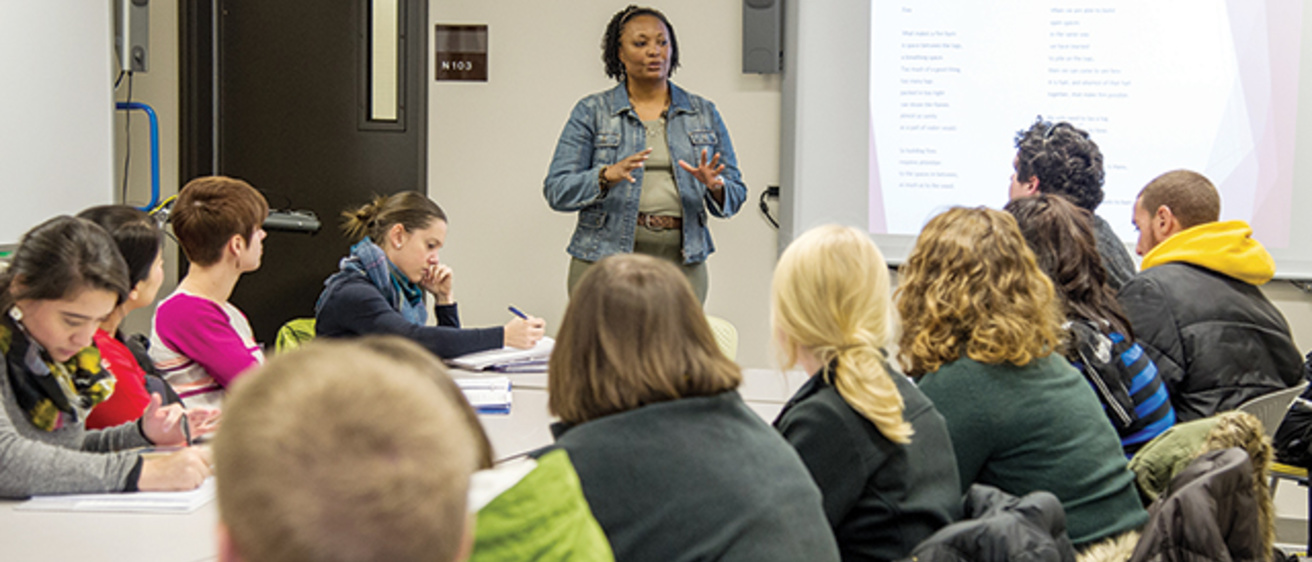by Joelle Brown
Watt, an associate professor of Higher Education and Student Affairs, is this year’s recipient of the College of Education Collegiate Teaching Award. The award is the college’s highest honor recognizing excellence in teaching.
“Fundamentally, I love to teach,” she says. “I value creating environments where students can explore identity in ways that are personally and professionally meaningful as well as practically useful.”
Watt’s research focuses on designing multicultural initiatives, exploring privilege and various aspects of identity, which provides a backdrop for students to engage in difficult dialogues about complex social issues.
“Dr. Watt encourages students to critically examine their assumptions and perspectives about themselves and the world around them. She recognizes that the work she does plays a role in helping students recognize systems of oppression and their contribution to it, which can shake students’ foundations,” says Kristi Mindrup (PhD ’12).
These discussions play a significant role in students’ educations.
“I grew up in China and because of cultural and value differences, some concepts or topics that were brought up in Dr. Watt’s classes were those that I did not hear about or talk about before I came to the United States,” says Shuhui Lin, a first-year master’s student. “It was not until Dr. Watt’s class that I learned about all of these different identity topics. Just being in those conversations was so eye opening to me.”
Cindy Ann Kilgo, a doctoral student, describes Watt’s approach to teaching as the head, the heart, and the hand. She incorporates her research, the course readings and theory (the head), with the personal lived experiences (the heart), and practical applications of topics (the hands), to make a deep impact on her students.
“Dr. Watt often participates in course discussion and shares her own struggles with the content and course material,” says Kilgo. “The vulnerability in her teaching method shows her genuine interest in students’ learning, and her personal reflections allow students to see real-life examples of the material as well as realize that they are not alone in grappling with the course content.”
Watt has also been an influential advisor to many of her students.
“Dr. Watt asks all of the right questions to guide students toward self-reflection, help them find comfort during times of academic ambiguity, and serve as a motivating coach and mentor,” says Mindrup. “Even after earning my Ph.D., she continues to reach out for collaboration opportunities that build on our conversations, projects, and research while I was a student at the University of Iowa.”
Aside from her research and departmental teaching and advising, Nicholas Colangelo, dean of the College of Education, and the Provost’s office asked Watt to design courses that involve collaboration between the University of Iowa and the Iowa City public schools. The courses, Leadership and Public Service I and II, places UI students in mentorships with Iowa City students and provides the opportunity for the University students to see first-hand how matters of identity, power, privilege, and oppression are played out in the community.
Students in the class found these mentorship experiences to be thought-provoking and self-awakening.
“Students leave Dr. Watt’s courses with the knowledge, skills, and awareness to challenge injustices and work towards social change,” says Kira Pasquesi (BA ’05), now a doctoral student.
Throughout all of her various roles, whether she is leading a class or mentee, researching and producing scholarship on multicultural initiatives, or innovating by building a new class, Watt says, she is “committed to the transformative nature of learning.”
